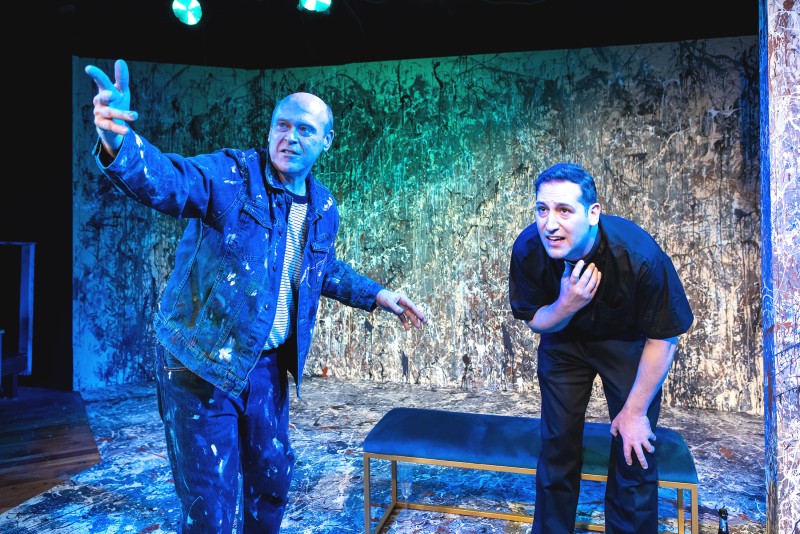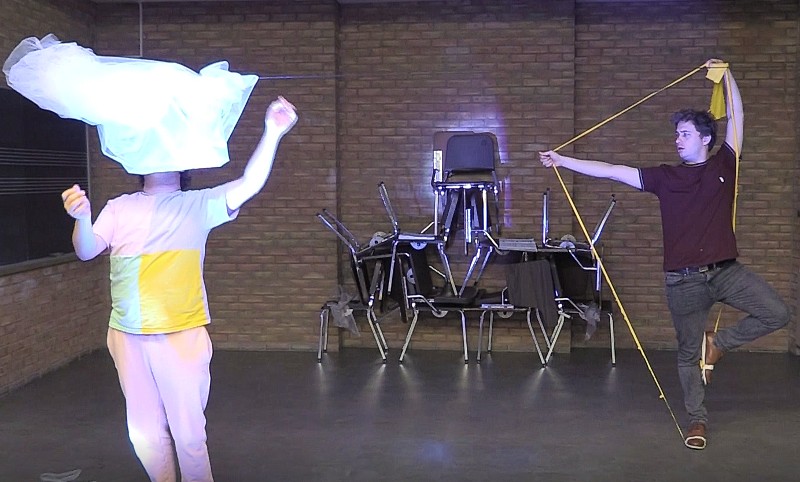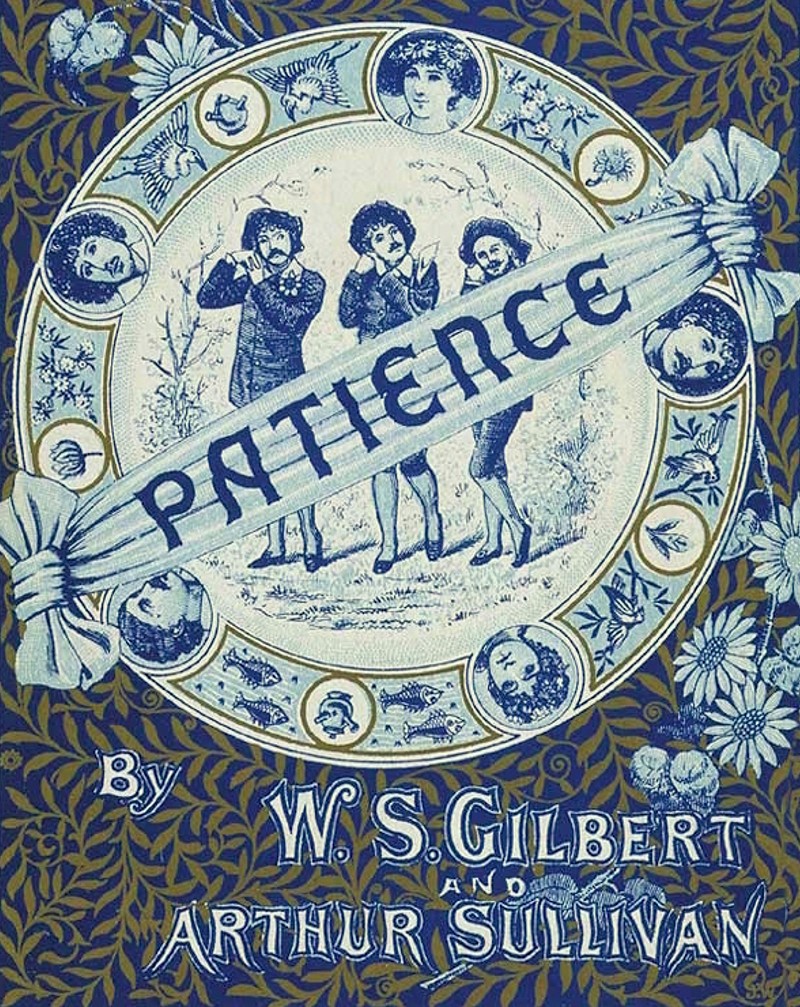Golden Years: Purple Rose Theatre's "Jukebox for the Algonquin" focuses on seniors living and loving

Billed as “a serious comedy about sex, drugs, and rocking chairs,” Paul Stroili’s Jukebox for the Algonquin transpires at Placid Pines, a senior living community in the Adirondack region of New York, circa 2003.
This Purple Rose Theatre Company world premiere, which runs July 7-September 2, features characters who hail from the boroughs of New York City. They now find themselves removed from their usual surroundings and the people they loved, but they are ready to accept new challenges—even to create them.
Audiences may recognize playwright Stroili from his first-rate performances on the Rose stage—God of Carnage, Welcome to Paradise, and Watson in David MacGregor’s Sherlock Holmes series—or from TV appearances on Empire, Chicago P.D., Undercover Bridesmaid, and more.
Stroili says his venture into playwriting was “born of adversity.” He was booking roles in Los Angeles only sporadically and decided to write something for himself. Straight Up With a Twist enjoyed more than 1,000 performances nationwide and culminated in a twice-extended Off-Broadway run.
Encore Theatre's "42nd Street" brings excellent energy to a classic backstage story

The Encore Theatre’s production of 42nd Street is a great burst of energy, a thunderous display of tap dancing and a funny, charming, nostalgic return to another place and time.
When the curtain rises, the intimate Encore stage is full of rigorously syncopated dancers rehearsing in a frenzy. The bright colors, lights, and energetic tap dancing that open the show display the special mix of Depression-era anxiety and the joy of putting on a musical.
In 1980, Broadway producer David Merrick gambled that the 1933 hit movie musical 42nd Street would find a new audience on Broadway. Under the direction and choreography of Gower Champion, the show struck gold.
The 1933 movie had been a big hit, coming as it did in the midst of the Great Depression, and it acknowledged the hard times while promoting the idea that things will get better—and in the meantime, let’s have some fun. Based on a novel, the musical introduced the classic story of the chorus girl who becomes a star.
The STEM of the Problem: "Digging Up Dessa" follows a young female archeologist grappling with sexism in the science world

Getting Dirty: Digging Up Dessa at EMU unearths the truths of both past and present
Digging Up Dessa gives women all the credit.
Presented by the EMU Department of Theatre, the play seeks to restore credit to the female scientists whose discoveries were claimed by their male colleagues.
Dessa (Lauren Pride) is a young girl obsessed with fossils, archeology, and science. Her world has just been turned upside down due to the passing of her father. The entire family was involved in a freak car accident and he did not make it, leaving Dessa and her mom, Esther (Cassie Paige).
Ever since the accident, Dessa has seen visions of Mary Anning (Mollie Cardella), a scientist from the 1800s who made uncredited breakthroughs in archeology. Anning was a real person, and even though she discovered numerous creatures, including the first Ichthyosaur, she was not eligible to join the Geographical Society in London because she was a woman. No one else can hear or see Anning, and she helps Dessa deal with life as an aspiring female scientist.
A Ghost Story: Purple Rose’s world premiere of the humorous but serious "In Common" explores friends struggling with relationships, past and present

A young woman races about frantically trying on one dress after another. She’s going out to meet with friends who want to introduce her to a man. But she’s not sure she’s ready yet.
Melanie is haunted by a memory. Her friend, confidante, and soulmate was killed after an incident in a bar. She watched it happen and saw him taken away by police. Melanie is white, her friend Cyrus was black. Another case of being in the wrong place, at the wrong time, with the wrong people.
Cyrus died, but to Melanie he’s still alive, still giving her advice, still making her laugh. Recreational drugs and prescribed drugs don’t relieve her sense of guilt. But now, with the help of her friends, she grasps for something new.
The Purple Rose Theatre is presenting the world premiere of playwright Quinn D. Eli’s In Common, a play that balances a caustic sense of humor with a serious look at complicated relationships in a complicated urban environment.
Director Rhiannon Ragland and her excellent cast get the balance just right. The setting is, as Eli notes, “American, urban, Brooklynesque” and the time is “two years after Obama.” Things are more than a little uneasy, but Melanie and her friends are working through it.
Action Pain-ing: The ghost of painter Jackson Pollock is a conflicted priest's confidant in Theatre NOVA's "SPLATTERED!"

Conventional wisdom teaches us that “art heals,” but not usually via advice from a long-dead painter who suddenly reappears near one of his most famous works.
Nonetheless, this exact situation stands at the heart of Theatre NOVA's world-premiere production of SPLATTERED! by Hal Davis and Carla Milarch, directed by Briana O’Neal.
Set inside New York’s Museum of Modern Art, priest-in-training Justin (Artun Kircali) has snuck away from a wedding reception, with a champagne bottle in hand, to try and pull himself together. He’s just presided over the wedding of his cousin and best friend, Astrid (Marie Muhammad), but we initially don’t know why he’s drinking, cursing, and frantically praying in this gallery while confronting Jackson Pollock’s splatter painting “One: Number 31, 1950.”
But he’s not alone for long: Astrid soon finds him and, eventually, Justin’s old flame Sylvie (Allison Megroet) does, too. Yet it’s the surprise appearance of Pollock’s ghost (Andrew Huff) that provides Justin with an opportunity to unpack the unwieldy emotional baggage he’s carrying, which makes him reconsider his life choices and future.
SPLATTERED! runs a little over an hour, and other than two very brief Sylvie flashbacks, it unfolds in real time and the audience must work hard to piece together what’s happened between these characters in the past. During one early moment of confusion, I had initially guessed that Justin had been hopelessly pining for Astrid. Despite those initial thoughts, this short play doesn’t feel as fleeting as one might expect.
University of Michigan drama professor Kate Mendeloff passes away from cancer

Kate Mendeloff, a drama lecturer at the University of Michigan who directed the annual "Shakespeare in the Arb" plays for two decades, died on Saturday, April 15, from pancreatic cancer. She was 69.
MLive.com staff writer Samuel Dodge wrote a wonderful obituary for the beloved educator, director, wife, and mother:
Take a Leap: Fifth Wall's new abstract chamber-rock opera "The Precipice" debuts at Riverside Arts in Ypsilanti

Our lives are not static.
We go through changes, we ask questions.
What does leaving home involve? What's it like to move on from relationships? What does any life change entail?
Fifth Wall Performing Arts, a multidisciplinary troupe that does experimental musical theater, tackles questions like these in Karl Ronneburg‘s The Precipice.
Karl, who uses only his first name professionally, created a collage, woven from journal entries, poems, letters to friends, music, and voice memos—his own and those of Grey Rose Grant—to create the abstract chamber-rock opera.
Audiences at Riverside Arts in Ypsilanti on April 29 and 30 will witness the world premiere of The Precipice before the company brings the piece to New York City.
Turn Down for What?: U-M’s production of “Rent” brightened the corners of the play's darker edges

For me, it’s telling that the most moving moment of the University of Michigan’s School of Music, Theatre & Dance’s production of Rent on April 15 came via a curtain call reprise of the show’s iconic song, “Seasons of Love.”
Having taken their bows, the performers slowly clustered together in the middle of the stage, and you could palpably feel the camaraderie among them. That camaraderie didn’t radiate from their characters, but from their real-life experiences as college students, including graduating seniors, who’ve grown close while training and building on shows like this one. The warmth coming from that stage made my hair stand on end.
And in keeping with the program’s esteemed national reputation, the students had hit their marks and their notes (well, most of them) all evening. So why exactly did this polished production feel … well, too buttoned up and tame?
Gilbert and Sullivan’s 1881 comic opera "Patience" skewers a popular art movement of the day—and the satire still stings

When Gilbert and Sullivan’s operetta Patience opened on April 23, 1881, London’s Savoy Theatre had another hit from the popular duo. Patience had another witty and stinging libretto from W.S. Gilbert and a witty and lush score from Arthur Sullivan.
Gilbert and Sullivan once again tapped into the latest fad by lampooning the aesthetic movement of the 1880s and '90s. The art-for-arts-sake approach to the arts, including theater, was itself a critique of art with a message or political manifestos. Though the movement preceded Oscar Wilde, he is often cited as an example of the aesthetic approach.
Over time, Patience has not been performed as frequently as Gilbert and Sullivan’s other comic operas, HMS Pinafore, The Pirates of Penzance, and The Mikado.
Cameron Graham is directing the University of Michigan Gilbert and Sullivan Society production of Patience, which runs April 13-16 at the Lydia Mendelssohn Theater, and believes it has a lot to say about our own self-involved times as it did when it first wowed the London audiences.
Luck of the Draw: "Everybody" bets on the lottery of life and explores the Big Questions

Is everything in life due to random chance or does everything really happen for a reason?
When it’s your time to leave this life, what do you hope to bring with you to the grave?
These are just a few of the introspective questions tackled in Branden Jacobs-Jenkins’s play Everybody, on stage at the Arthur Miller Theatre through April 9. The show is adapted from the play Everyman, which was first printed by an unknown playwright in 1530.
This semi-interactive show begins before you even enter the theater.


































